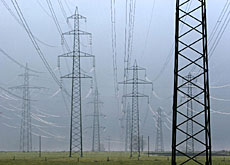Senate green-lights electricity liberalisation

Parliament has decided in principle that the Swiss electricity market should be liberalised in two stages and operated by companies funded by public money.
The uncontested decision by the Senate, based on a proposal by a parliamentary commission, comes four years after the electorate rejected proposals to liberalise the electricity supply in a nationwide vote.
The government now says power suppliers, which own the networks but have to ensure that most of the funds belong directly or indirectly to the cantons or the communities, should align their business with non-listed companies.
These should aim to join forces within five years to become a national network.
“The market is in all aspects the best regulator,” said centre-right Radical Party member Rolf Schweiger after Tuesday’s decision. “Where there are monopolies, [the market] fails.”
Carlo Schmid from the centre-right Christian Democrats said the Senate commission’s plan was a solution that had been adopted by 12 European Union countries.
The Senate’s approval follows the vote by the House of Representatives in September 2005 in favour of a two-stage approach to liberalisation of Switzerland’s electricity market.
The move foresaw opening the market first to big electricity providers in 2007 and later to private homes in 2012.
Power hub
The government had previously argued that Switzerland, as a European power hub, could not stand offside as the internal EU electricity market became more developed.
Under the draft law, all end-users would be able to choose their supplier freely by 2007, as is currently the case in the telephone market.
Such a change would bring Swiss legislation closer into line with that of the EU, which also wants to introduce consumer choice.
Battle lines in the debate have been clear for a while. The centre-right and rightwing parties, supported by the Swiss Business Federation (economiesuisse) and the leading power producers, have always pushed for an immediate liberalisation.
The Swiss Trade Union Federation, which mounted a successful challenge against the first proposal, and the centre-left Social Democrats favour a staggered opening up of the market. They have campaigned for a cautious, two-stage liberalisation, which should only apply to the big providers at first.
The power supply law aims to lay the framework for the liberalisation of the Swiss electricity market. Currently regions have their own, partly state-controlled power suppliers, each with their own supply monopoly.
The government says that the general conditions for electricity supply in Switzerland have changed over the past few years.
It points out that the Federal Court recognised the right to third-party network access in June 2003, and that the significance of cross-border electricity trade has increased.
swissinfo with agencies
The proposal for the liberalisation of the energy market has been separated into three parts:
Power supply law, which lays down the framework for the opening up of the power market.
Electricity law relates to international power transport and EU guidelines.
Energy law includes measures for the promotion of renewable energy.
Swiss electricity market 2005:
Imports from European Union: 47 billion kWh (kilowatt hour).
Exports to EU: 40.7 billion kWh.
Electricity consumption: 61.6 billion kWh.
In 2002, Swiss voters rejected plans to liberalise the electricity market along EU lines.
In 2003, the government set up an expert group to find a solution allaying fears that competition could endanger security of supply.
September 21, 2005: the Swiss House of Representatives voted for a two-stage approach to liberalisation of Switzerland’s electricity market.
October 3, 2006: the Swiss Senate approved liberalisation of the electricity market.

In compliance with the JTI standards
More: SWI swissinfo.ch certified by the Journalism Trust Initiative











You can find an overview of ongoing debates with our journalists here . Please join us!
If you want to start a conversation about a topic raised in this article or want to report factual errors, email us at english@swissinfo.ch.